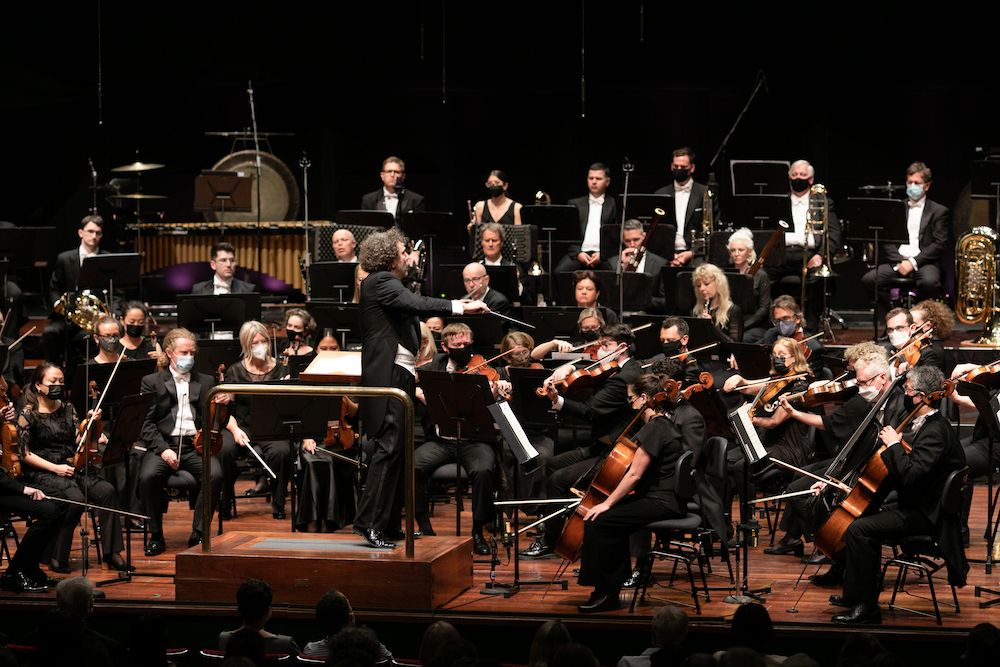Tchaikovsky’s ‘Sixth Symphony’, or the ‘Pathetique’, has always carried a sense of darkness, which makes WASO’s performance of the composer’s final work perfect for these uncertain times, writes Rosalind Appleby.
WASO plays a symphony for tumultuous times
21 March 2022
- Reading time • 5 minutesMusic
More like this
- Rewriting tradition with skill and charm
- Close encounter stirs the soul
- The great unknown
‘Tchaikovsky’s Pathetique’, West Australian Symphony Orchestra ·
Perth Concert Hall, 18 March 2022 ·
When it premiered in 1893 Pyotr Ilych Tchaikovsky’s Sixth Symphony was considered portentous for its references to the Russian Orthodox burial lament, its unusually slow final movement and because the composer died shortly after the work was premiered. Today, performed by the West Australian Symphony Orchestra (WASO), the work’s sense of sinister foreboding and brash antagonism feels like an apt reflection of the complexities of our current world and the war crisis in Ukraine.
In contrast, the elegant beauty of works by Mozart and Australian composer Maria Grenfell offer some balance to this first concert in WASO’s MACA Classics Series.
Despite the obvious impact of the pandemic (the mask-wearing orchestra, the large number of WASO musicians replaced by casual players and the 50 per cent capacity audience), the energy is high, bolstered in part by the presence of Asher Fisch returning for his eighth year as principal conductor.
Maria Grenfell’s River Mountain Sky is an evocative concert opener. Grenfell, an associate professor at the University of Tasmania Conservatorium of Music, drew inspiration from the Tasmanian landscape for this work. It begins with a bubbling flute melody reminiscent of the opening of Smetana’s Moldau. Swells of energy erupt and subside and a flowing chorale melody is decorated by sprinkles of harp and thuds of timpani – a waterfall? The work is punctuated by chords that are occasionally mis-timed by different sections, but stability is quickly restored. Grenfell’s orchestration is exquisite, ultimately evaporating into misty layers of strings with glimmers of light from harp and vibraphone.

Fisch moves from conductor to soloist for a remarkably elegant performance of Mozart’s Piano Concerto No 24. The work is in C minor and Fisch’s smooth legato technique has a sateen veneer that perfectly conveys that key’s languishing, sighing effect. Fisch’s self-effacing performance emphasises rhythmic precision and interplay with the orchestra, however this comes at the cost of deeply felt musical expression. Some clarity of ornamentation is also lost due to the heavy legato pedalling. However, the chamber-like intimacy of the performance allows for moments of wonderful dialogue between orchestra and conductor, revealing the democratic relationship that has evolved over the years.
After interval, the ominous bassoon and cello sets the scene for the opening to Tchaikovsky’s Symphony. But this is also the composer of Nutcracker and the winds capture some of this animation in their moments of fast and fun interplay. Fisch crouches like a jockey as the strings gallop to this movement’s heart-wrenching climax, which is hammered out by timpani before being dragged into the abyss by the low brass.
The lilting folk dance of the second movement is captured skilfully by the winds, making graceful the off-kilter 5/4 time signature. Fisch is brisk and efficient; I would’ve liked perhaps a little more romantic self-indulgence.
The march-like third movement opens with buoyant precision and Tchaikovsky’s hints at caustic cynicism (foreshadowing Shostakovich) are played with bravado by the brass section, who are in exceptional form in this work. The climatic false finish draws spontaneous applause from the audience.
And finally the audacious ‘Adagio lamentoso’ arrives, the movement which turns symphonic form on its head with its intensely personal, mournful ending. Fisch draws out a Brahmsian weightiness and also – with the flick of a wrist – an abruptness again reminiscent of Shostakovich. Tchaikovsky’s persistent, questioning phrases remain unresolved and instead the throbbing heartbeat rhythm in the basses fades to oblivion.
It is a soul-wrenching portrayal of both vibrant life force and devastating loss, which was ground-breaking in 1893 and remains equally true to our tumultuous times over a century later.
WASO’s next concert is ‘Vivaldi’s Four Seasons’ 31 March – 2 April 2022.
Pictured top: Asher Fisch on piano for Mozart’s ‘Piano Concerto No 24‘. Photo: Daniel Grant
Like what you're reading? Support Seesaw.






